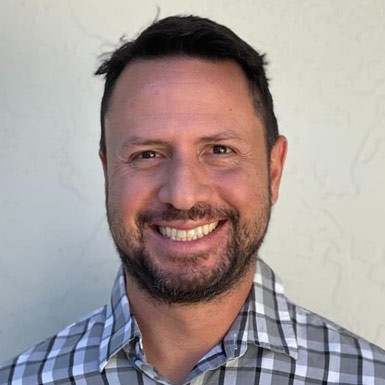How was this content?
Why Guild CFO Chris Garber believes lifelong learning is the key to startup success
You are reading the third installment of our thought leadership spotlight, “The evolving role of the startup CFO.” This series features perspectives from prominent players in the startup ecosystem.
The ed tech and skilling industry is booming. Businesses and investors are embracing job training and upskilling as strategies to create more adaptable and resilient workforces. But even in a crowded field, Guild stands out: the startup tripled its valuation in 2021, attracting key investors like Bessemer Venture Partners to help the company get to the next level.
Guild offers a sophisticated three-sided marketplace that connects employees who want to advance their skills and achieve career mobility, educational institutions that serve adult learners, and employers who want to invest in their employees’ growth. Guild’s proposition is that every person is a lifelong learner, and that businesses and people will benefit when employers invest in their employees by providing them access to the tools they need to grow.
So, it’s no surprise to hear Chris Garber, Guild’s CFO, sum up the company’s internal ethos: “it’s all about a learner’s mindset.” After sitting behind the CFO desk for a year and a half, Chris is the first to attest to how much he’s learned about steering the finances of a dynamic company like Guild, which must continue to grow while navigating a rapidly evolving landscape.
“The business is changing. The market is changing. The realities for the company are changing. And so, it is really about having your finger on the pulse of all of those dynamics,” Chris says.
Process, not structure
Chris is well aware that the addition of a “numbers guy” to the leadership team can provoke some anxiety about new restrictions or increased paperwork, and that people might yearn for the earlier, less fettered days in the startup’s lifecycle.
“There’s a stage of a company where you don’t need a CFO,” Chris acknowledges, “and another stage where you need a CFO, but you need them to perform a really specific controllership function. And then over time, what you need from that CFO really expands.”
Chris explains that having the right CFO adds a certain level of sophistication and maturity, but should not detract from the company’s ability to innovate, experiment, and change. “Some degree of process actually helps as a catalyst and accelerant to the business,” Chris says. “Good process helps you go faster with more volume. Bad process becomes bureaucratic and slows you down.”
A great startup CFO should not impose a rigid hierarchy. Instead, Chris sees the CFO’s role as helping the existing elements function better together. On many of Guild’s teams, Chris says, information flows laterally rather than too strictly along reporting lines. “We’re optimizing for nimbleness, for context, and for the ability to react as a team, rather than wait for somebody to tell you what to do next.”
A coach, not a scorekeeper
“Now I don’t think about it as, ‘The CFO’s only job is to make sure the books are right,’” Chris says. However, earlier in his career, he says he was much more concerned about holding the business to account against the balance sheet. But a meaningful conversation with the CEO of the company where he worked before Guild changed his mindset. “He said, ‘I need finance to be a coach, not a scorekeeper,’” Chris recalls. “Now, I see the CFO’s role as a guide and a catalyst for helping all the different parts of the business get better.”
From the cross-functional vantage of finance, it’s easier to monitor the different moving parts of the company and see connections that, perhaps, other team-members aren’t yet aware of. “You’re one of the few places where those kinds of dots get connected,” Chris reminds his fellow CFOs. “Our job is to shine light on those things and help each part of the company prioritize and focus on the most important things.”
Speaking many languages
“For a modern CFO to make sense of that high-level view,” Chris says, “it’s essential to be conversant in every aspect of the business’s operations in order to connect strategy and execution. You’re never done learning about the business, about how the organization works.” Chris notes that the best preparation for a startup CFO, along with solid financial bonafides, is deep experience with the non-finance side of the business. “You need to learn the language of engineering. Of sales. Of professional services. Of marketing and product management.”
Other parts of the company might have to learn to speak finance as well. Chris encourages his team members to see financial tools as “a new language we can bring into how we think about what decisions we make.”
Meanwhile, CFOs—especially at startups—have to pick up another language: Chris calls it “persuasive capability.” CFOs have to either make or drive decisions, and they do that, Chris says, by telling compelling stories and making convincing arguments. These are likely to be quantitatively informed, but they have to appeal at a human level.
Nimble at any scale
Despite stereotypes about moving fast and breaking things, Chris says, there’s less difference than one might think between stewarding the finances of a successful startup and those of a more established company. “If you’re in a dynamic business, the behaviors that contribute to success are actually really similar,” Chris says. “The difference is mostly scale.”

Kate Radinovic
Kate Radinovic is a Senior Field Marketing Manager on the AWS for Startups team. Kate closely partners with AWS for Startups Business Development to bring investment and ecosystem perspectives into AWS’ startup programming. Prior to AWS, Kate worked in SaaS, holding various roles in field marketing, partner marketing, and community marketing.

Dave Abrameto
Dave Abrameto is a Principal Business Development Manager in the AWS Early Stage Startups Team. He works with Seed stage VCs to support their portfolio companies. Prior to AWS, Dave co-founded Rev.com, a VC-backed speech-to-text AI service, and spent 10 years building it into a $100M ARR business, wearing multiple hats including as CFO, product and GTM leader.
How was this content?